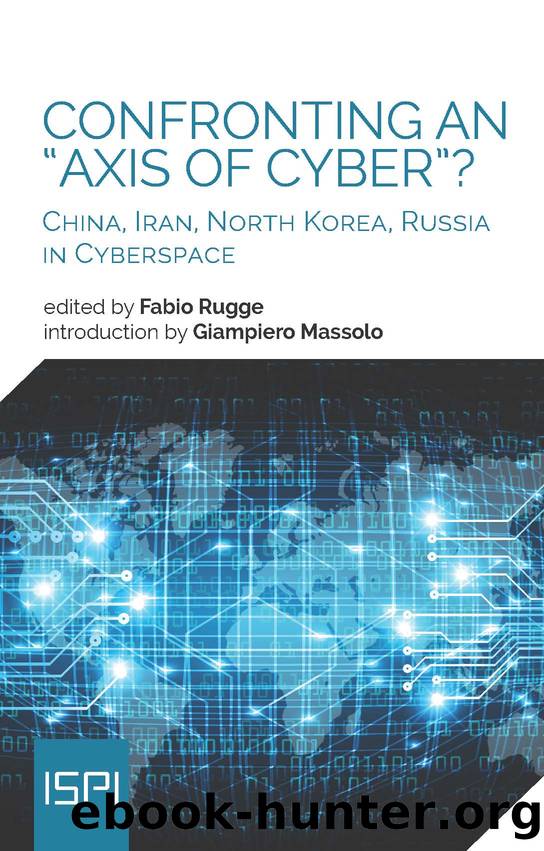Confronting an Axis of Cyber?: China, Iran, North Korea, Russia in Cyberspace by Fabio Rugge

Author:Fabio Rugge [Rugge, Fabio]
Language: eng
Format: epub
Tags: Computers, Cybernetics, Security, General, Political Science, International Relations, Geopolitics
ISBN: 9788867058655
Google: 4DFHvgEACAAJ
Goodreads: 57016804
Publisher: Ledizioni
Published: 2018-01-15T07:39:32+00:00
5. Iranâs Cybered Warfare Meets Western Cyber-Insecurity
Lior Tabansky
A security threat stems from a combination of intent and capability. According to the current National Security Strategy of the United States of America, Iranian expansion, jihadist ideology, and regional rivalries have for years convulsed the Middle East55. Iran exploits cyber technology for every instrument of power, but IT-security practitioners only focus on technical aspects of the adversarial action. Similarly, many political analysts fail to overcome conceptual limitations regarding state responsibility for cyberattacks. The article aims to strategically analyse cyber power, integrating strategic Iranâs intent and Iranâs latest global cyber offense. Improved conceptualisation of cyber power may mitigate the Western difficulties with providing national cybersecurity.
Cyber Power
Kuehl has defined cyber power as â[â¦] the ability to use cyberspace to create advantages and influence events in other operational environments and across the instruments of powerâ56. Cyber power thus cuts across Diplomatic, Informational, Military, and Economic (DIME) instruments of power as technology morphs and interconnects these elements. These changes enable numerous known and unknown methods to produce preferred outcomes within and outside cyberspace. Since most of the worldâs information is digitally produced, processed, stored, and transmitted, cyber power must be intertwined with information57. Indeed, adversaries have long experimented with applying cyber power in espionage-driven economic damage, threats to critical infrastructure, and mass subversion58. Joseph Samuel Nye, Jr, one of the most influential International Relations scholars as well as an experienced practitioner, defined hard and soft power in a seminal 1990 article59. Hard power relies on coercion and payment, while soft power uses the framing of agendas, attraction, or persuasion. Manipulation of information may, in principle, assist each type of hard and soft power along a spectrum from command to co-option. Two decades later, Nye also masterfully discussed cyber power, including both physical and informational aspects60.
Cybered conflict, the term coined by Demchak and Dombrowski, means that adversarial and competitive relationships have a significant computerised dimension. The success or failure of major participants is critically dependent on computerised key activities along the path of events.
Cybered conflict differs from cyber war or cyber battle. The latter is fully technological and could, in principle, be conducted entirely within a network. It is normally a component of the former. A cybered conflict is any conflict of national significance in which key events determining the path to the generally accepted outcome of the conflict could not have proceeded unless cyber means were non-substitutable and critically involved61.
To illustrate the adversarial cybered operations and their role as an instrument of power, I analyse Iranâs strategy, goals, and cyber means, employing the recently disclosed Iranian cyber offense campaign.
Iran National Security Strategy and the Volatile Environment
The Islamic Republic of Iran is a revolutionary ideology-driven regime. Given the history of the 1979 revolution, the main threat to Iran is the US: Khamenei refers to the US as the âGreat Satanâ, and to Israel as the âLittle Satanâ. The risk of Western military invasion was high in Iranâs eyes when the US invaded Iraq to topple Saddamâs regime.
Download
This site does not store any files on its server. We only index and link to content provided by other sites. Please contact the content providers to delete copyright contents if any and email us, we'll remove relevant links or contents immediately.
The Secret History by Donna Tartt(19053)
The Social Justice Warrior Handbook by Lisa De Pasquale(12187)
Thirteen Reasons Why by Jay Asher(8893)
This Is How You Lose Her by Junot Diaz(6877)
Weapons of Math Destruction by Cathy O'Neil(6265)
Zero to One by Peter Thiel(5786)
Beartown by Fredrik Backman(5737)
The Myth of the Strong Leader by Archie Brown(5500)
The Fire Next Time by James Baldwin(5431)
How Democracies Die by Steven Levitsky & Daniel Ziblatt(5215)
Promise Me, Dad by Joe Biden(5141)
Stone's Rules by Roger Stone(5081)
A Higher Loyalty: Truth, Lies, and Leadership by James Comey(4954)
100 Deadly Skills by Clint Emerson(4921)
Rise and Kill First by Ronen Bergman(4779)
Secrecy World by Jake Bernstein(4741)
The David Icke Guide to the Global Conspiracy (and how to end it) by David Icke(4708)
The Farm by Tom Rob Smith(4502)
The Doomsday Machine by Daniel Ellsberg(4484)
